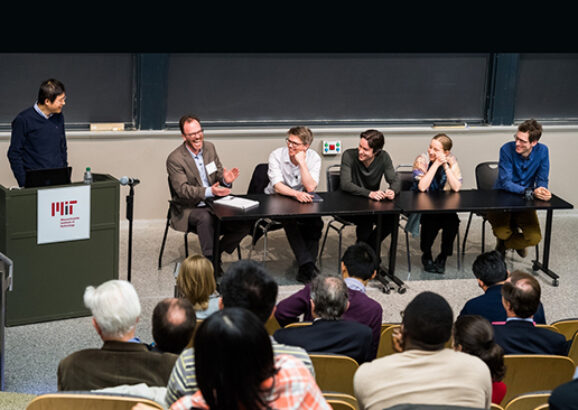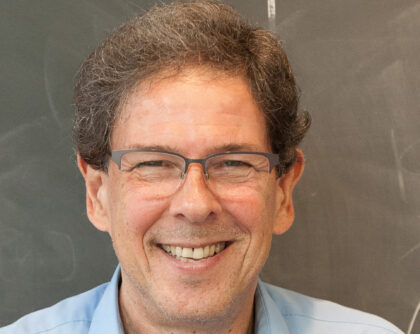Barton Zwiebach
Research Interests
Professor Zwiebach¹s specialties are String Theory and Theoretical Particle Physics. His central contributions have been in the area of String Field Theory, where he did the early work on the construction of open string field theory and then developed the field theory of closed strings. Zwiebach has also made important contributions to the subject of D-branes with exceptional symmetry and to the subject of tachyon condensation.
In 1999, Ashoke Sen and Zwiebach showed that open string field theory can be used to calculate the tachyon potential and to confirm the existence of a critical point at the expected depth. The developments that followed led to vacuum string field theory, a new version of open string field theory based on the vacuum of the tachyon. In the early 2000’s Zwiebach studied the cosmology of closed string tachyons and, together with Okawa and Berkovits, developed heterotic string field theory. Zwiebach then worked on exact analytic solutions in open string field theory. Starting in 2009, Zwiebach and Chris Hull began work on double field theory, an approach that aims to capture the T-duality properties of string theory in effective actions. Together with Olaf Hohm, Hull and Zwiebach constructed an action in terms of the generalized metric that incorporates a number of elements of generalized geometry. Zwiebach’s work on this area made showed how higher-derivative corrections in gravitational theories are constrained by T-duality. Moreover, it demonstrated how the derivative corrections in the well-known Green-Schwarz anomaly cancellation mechanism fit elegantly into a deformation of generalized geometry.
More recently, Zwiebach has investigated a number of issues relevant to string field theory. These include, L-infinity algebras, with OIaf Hohm, algebras that first appeared in explicit form in closed string field theory; minimal area metrics, with Matthew Headrick, relevant to higher-genus string diagrams, and hyperbolic string vertices, with Kevin Costello, providing a new and explicit description of all closed string field theory interactions.
Biographical Sketch
Barton Zwiebach is presently Professor of Physics at the MIT Department of Physics. Zwiebach was born in Lima, Peru. His undergraduate work was done in Peru, where he obtained a degree in Electrical Engineering from the Universidad Nacional de Ingenieria in 1977.
His graduate work was in Physics, at the California Institute of Technology. Zwiebach obtained his Ph.D. in 1983, working under the supervision of Murray Gell-Mann. He has held postdoctoral positions at the University of California, Berkeley, and at MIT, where he became an Assistant Professor of Physics in 1987, and a permanent member of the faculty in 1994.
Teaching Interests
Professor Zwiebach designed and taught a new course in the MIT undergraduate curriculum: String Theory for Undergraduates [8.251], first offered in the 2002 Spring term. This course gives a serious introduction to string theory, geared at the level of juniors and seniors. Based on the lectures from this course, Zwiebach wrote an undergraduate textbook, A First Course in String Theory, published by Cambridge University Press in 2004, with a second edition in 2009.
Professor Zwiebach was awarded the MIT School of Science 2003 Teaching Prize for Excellence in Undergraduate Education. His citation read: “[for] making a topic as complex as string theory accessible to undergraduates; for his uncompromising commitment to clarity and organization in his classroom; and for his ability to provide a truly transforming experience to his students.”
Since in 2009, Professor Zwiebach has been teaching the three-course undergraduate sequence on Quantum Mechanics. This work led to the construction of online versions of the courses (8.04x, 8.05x, and 8.06x), which have been offered world-wide on edX and used to create `blended’ courses at MIT through MITx. The notes for these courses were developed further by Zwiebach to produce an undergraduate textbook, Mastering Quantum Mechanics: Essentials, Theory, and Applications, published by MIT Press on April 2022. An errata page for this newly published book can be found here.

Center for Theoretical Physics celebrates 50 years
Symposium explores how novel ideas and experiments are advancing many areas of theoretical physics in newly interconnected ways.
Awards & Honors
- 2010 // Honorary Doctorate, Universidad Nacional de Ingeniería, Lima, Perú
- 2008-18 // Margaret MacVicar Faculty Fellow, MIT (Honors MIT's Best Teachers)
- 2007 // Honorary Doctorate, Universidad Tecnológica del Perú, Lima, Perú
- 2003 // Everett Moore Baker Memorial Award for Excellence in Undergraduate Teaching, MIT
